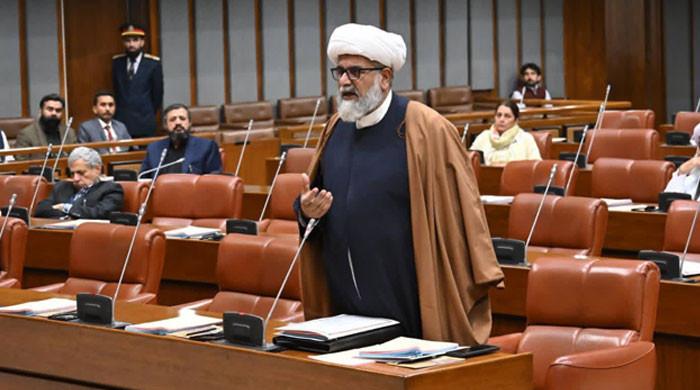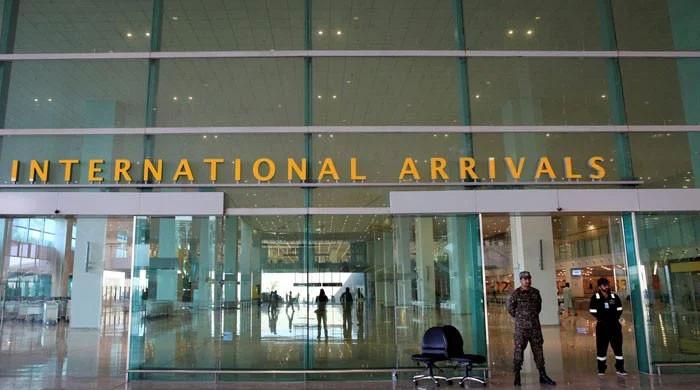Pakistani smuggler jailed for 40 years after shipping ballistic missile parts from Iran
Pakistani national arrested during US military operation in Arabian Sea in January 2024
October 19, 2025

- US court sentences Pahlawan after conviction on five counts.
- Muhammad Pahlawan arrested by US security forces.
- Pahlawan's crew say they were not aware of real plot.
LONDON: A weapons smuggler from Pakistan who used a fishing boat to ship ballistic missile parts from Iran to Houthi rebels in Yemen has been sentenced to 40 years in a US prison on five counts.
Muhammad Pahlawan was detained during a US military operation in the Arabian Sea in January 2024. Two US Navy Seals drowned in that operation, according to the US authorities.
Pahlawan's crew, who were working as fishermen, according to the US case, testified they had been duped into taking part and were not aware of the real plot. At that time, Houthis had launched missile and drone attacks on Israel, claiming they were acting in support of Gazans.
The components found on Pahlawan's boat were "some of the most sophisticated weapon systems that Iran proliferates to other terrorist groups", US federal prosecutors said after his trial.
The 49-year-old was sentenced after being convicted on five counts, including terrorism offences and transporting weapons of mass destruction. He has been convicted on five counts, making a total of 480 months or 40 years.
The eight crew members who testified in court said they had no idea what was inside the large packages on board the boat, named the Yunus.
One crew member said that when he questioned Pahlawan about it, he was told to mind his own business.
Pahlawan referred to himself as a "walking dead person" in text message exchanges with his wife in Pakistan, sent in the days before the January 2024 voyage, which would get him arrested.
"Just pray that [we] come back safely," said the message, used as evidence in court.
"Why do you talk like this, 'may or may not come back'," she asked him.
Pahlawan told her: "Such is the nature of the job, my dear, such is the nature of the job."
His final words to her before sailing were: "Keep me in your prayers. May God take me there safely and bring me back safely, alright. Pray."
The prosecution told the court that Pahlawan was paid 1,400 million rials (£25,200; $33,274), "part of a larger operation" funded and co-ordinated by two Iranian brothers, Yunus and Shahab Mir'kazei.
The US alleges the Mir'kazei brothers are affiliated with Iran's Islamic Revolutionary Guard Corps (IRGC).
Pahlawan made two successful smuggling voyages before he was caught - one in October 2023, and a second two months later.
The dozen men he recruited to join him were all from Pakistan and had travelled across the border into Iran looking for work.
Before setting off on the December trip, the US court heard, the crew were tasked with loading large packages onto the boat in Chabahar on Iran's south coast.
Then, after five or six days at sea, when they were close to the coast of Somalia, the crew described another boat pulling up next to them at night and them having to hand over the cargo.
Crew member Mehandi Hassan told the court there were about five men on the other boat, who spoke in a language he didn't recognise.
Their next voyage, the following month, was expected to follow the same route. As before, it began in the small port of Konarak before sailing to Chabahar, where the crew were made to load heavy boxes on board.
The packages, the US Navy would later discover, contained Iranian-made ballistic missile parts, anti-ship cruise missile components and a warhead.
He worked with the brothers to prepare the boat for these smuggling voyages, received specific coordinates from them for the ship-to-ship transfers, and received multiple payments from them for his role in the smuggling operation.
US federal prosecutors said the components found on Pahlawan's boat were "some of the most sophisticated weapon systems that Iran proliferates to other terrorist groups".
On 5 June this year, Pahlawan was found guilty of conspiring to provide material support and resources to terrorists; providing material support to the Iranian Islamic Revolution Guard Corps' weapons of mass destruction programme; conspiring to and transporting explosive devices to the Houthis, knowing these explosives would be used to cause harm; and threatening his crew.
"Pahlawan was not only a seasoned smuggler," prosecutors said, "he knew what he was smuggling and its intended use."
In a final plea to the court for leniency, Pahlawan's lawyer wrote that life for Pahlawan's wife had long been estranged from her family because of her marriage to him, and that since his arrest, her and her child's lives had become "extremely difficult and harsh".
"Since the jury verdict, Mr Pahlawan's singular focus in their telephone conversations is the well-being of his family," his attorney said. "He does not talk about himself or his fate. He cries with worry over what will become of his wife and child."
The court ruled that his high sentence was "appropriate due to the nature and circumstances of the offence and the history and characteristics of the defendant".
He was sentenced at the District Court for the Eastern District of Virginia.











